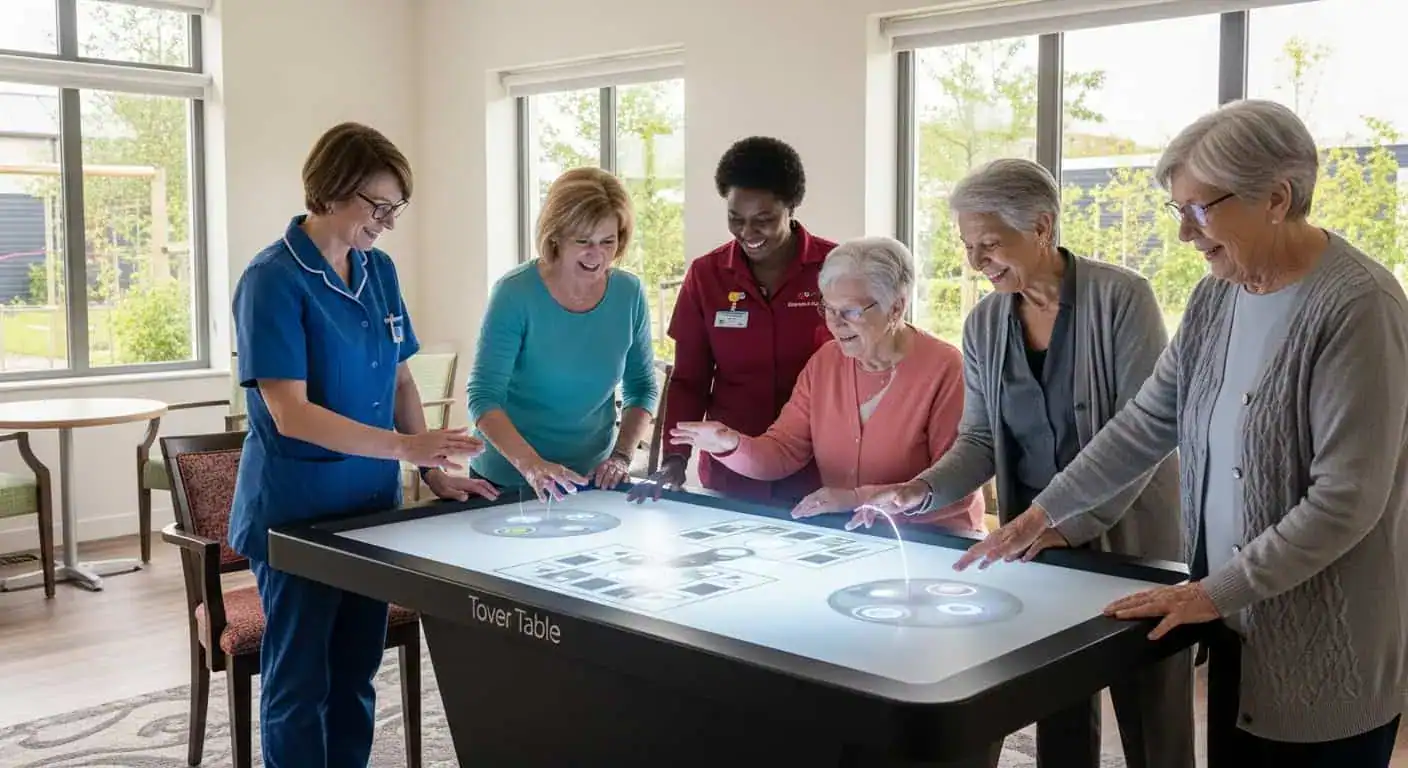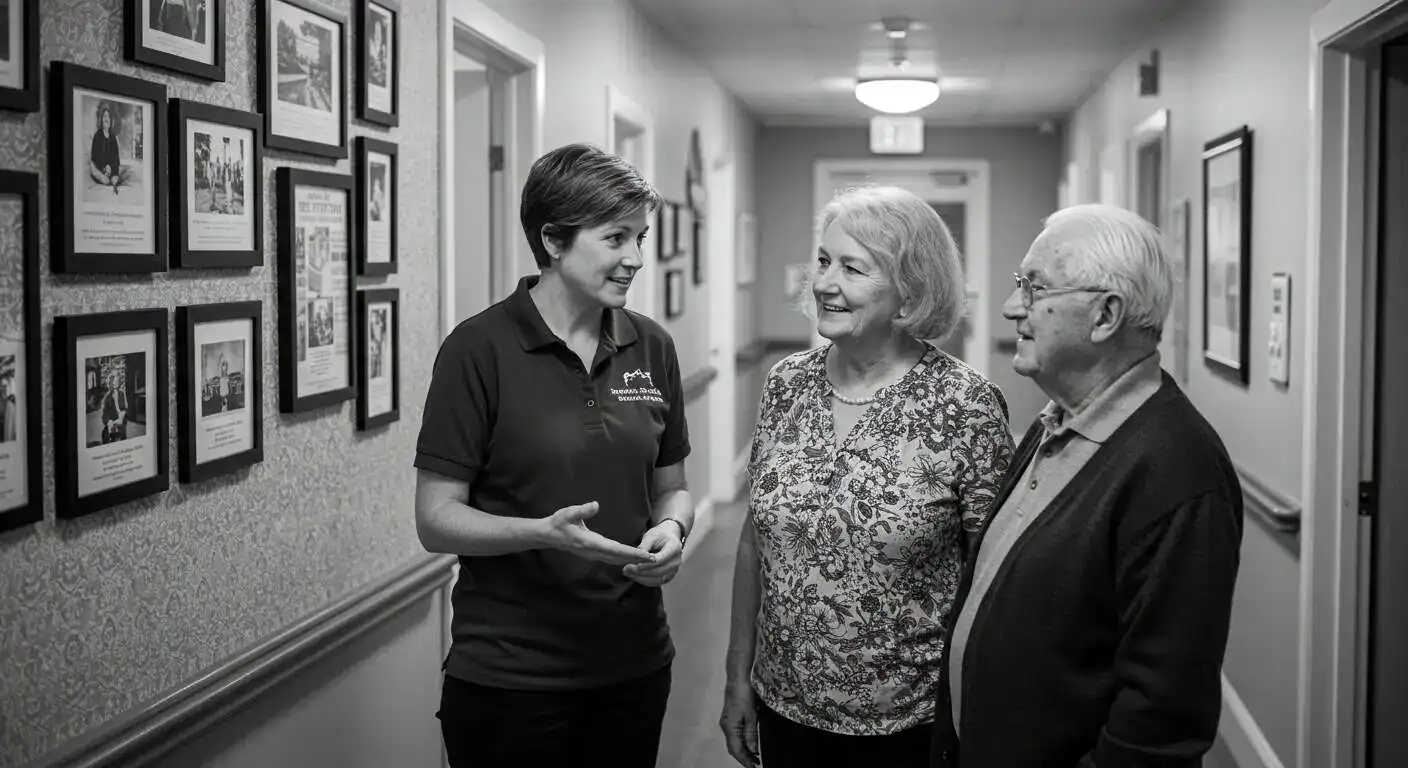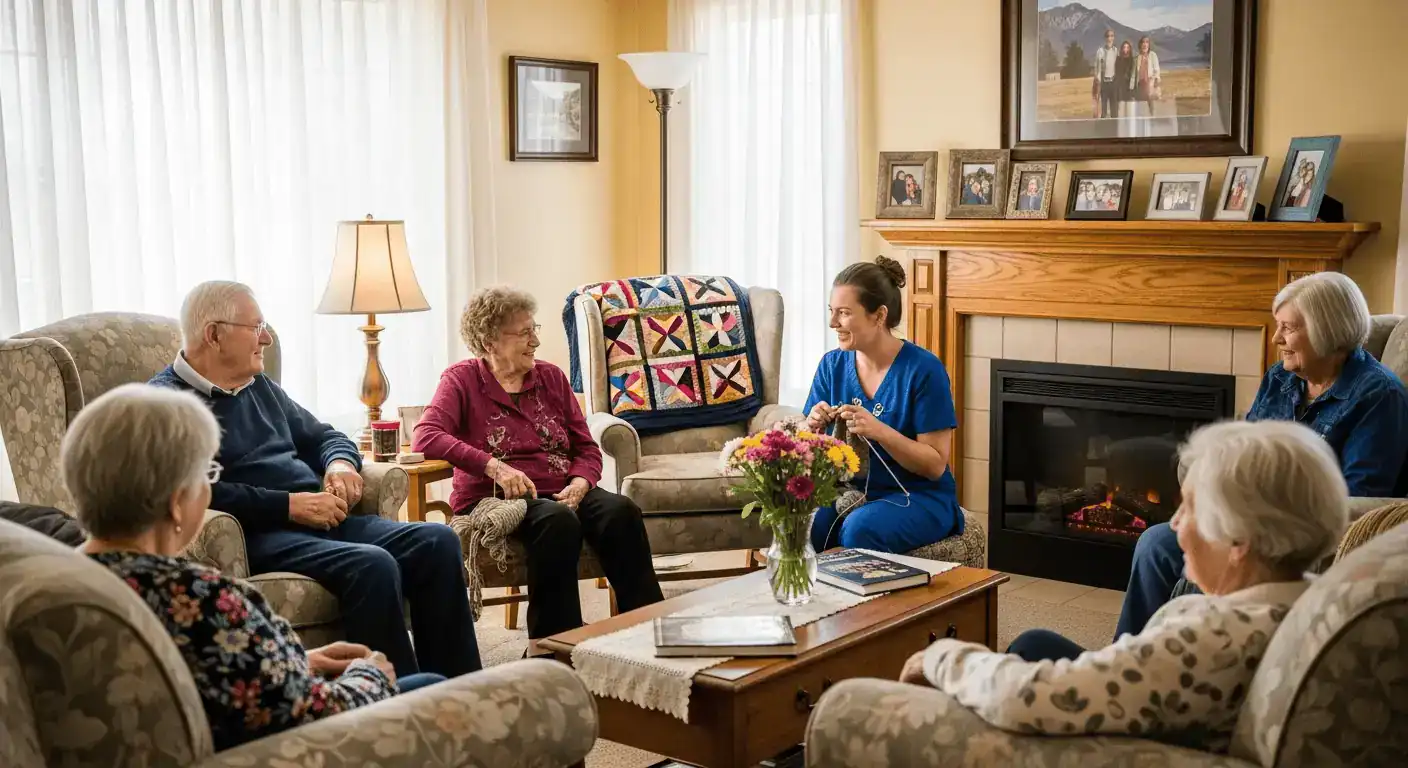Making the decision to seek memory care for a parent is one of the most profound and emotionally charged journeys a family can undertake. If you’re reading this, you are likely navigating a path filled with difficult questions, deep love, and a desire to do what is best for someone you cherish. Here in Reno, you are not alone in this process. The search for the right memory care Reno NV, is a journey shared by many families across Northern Nevada. It’s about more than finding a safe building; it’s about discovering a community that will honor your parent’s life story, nurture their spirit, and provide them with dignity, joy, and specialized support.
This guide is written from a place of understanding and local expertise. We want to walk alongside you, offering a calm, clear roadmap to help you navigate your options. We’ll explore what high-quality memory care truly means, what makes the Reno area unique, and how you can confidently choose a place that feels like home.

What Is Memory Care? Understanding the Specialized Support Your Parent Needs
Before diving into the search, it’s crucial to understand what sets memory care apart from other types of senior living. While often located within or affiliated with assisted living communities, memory care is a distinct and specialized form of long-term care designed specifically for individuals living with Alzheimer’s disease, dementia, and other cognitive challenges.
Unlike traditional senior housing in Reno, a cognitive care community offers a purpose-built environment and a higher level of support. The core goals are to:
- Ensure Safety: Memory care facilities have enhanced safety and security features, such as secured exits and 24/7 supervised environments, to prevent wandering and ensure residents’ well-being.
- Provide Specialized Care: Staff members receive specialized dementia training to understand the behavioral and cognitive changes associated with memory loss. They are skilled in communication techniques, de-escalation strategies, and providing assistance with activities of daily living (ADLs) in a way that preserves dignity.
- Promote Engagement: A key aspect of quality memory care is a focus on structured activities and memory enhancement programs. These are designed to stimulate cognition, reduce anxiety, and provide a sense of purpose and joy.
- Slow Cognitive Decline: Through social interaction, cognitive exercises, and a supportive environment, the goal is to help residents maintain their current abilities for as long as possible.
Essentially, when you are looking for dementia care in Reno, you are searching for a holistic ecosystem of care that addresses the medical, social, and emotional needs associated with memory impairment.
The Shifting Landscape of Dementia Care in Reno: Key Trends and Insights
The world of memory care is evolving, moving beyond old institutional models. Here in Reno, leading communities are embracing innovative, research-backed approaches that are transforming the quality of life for residents. Understanding these trends will empower you to identify facilities that are truly at the forefront of compassionate care.
Beyond Safety: The Rise of the Person-Centered Care Model
Perhaps the most significant evolution in memory care is the shift towards a person-centered care model. Recent studies overwhelmingly show that facilities focusing on deep, ongoing relationships between staff and residents see measurable improvements in residents’ well-being and overall quality of life.
What does this mean in practice?
- It’s Relational, Not Transactional: Staff aren’t just there to complete a checklist of tasks. They invest time to know each resident’s personal history, preferences, and personality. They become familiar faces and trusted companions.
- Care Plans are Individualized: Instead of a one-size-fits-all approach, care plans are tailored to the individual’s remaining abilities, interests, and daily rhythms. This respects their autonomy and identity.
- Dignity is Paramount: The focus is on what residents can do, not what they can’t. This philosophy guides every interaction, from helping with dressing to engaging in activities.
As Jennifer Carson, Ph.D., Director of the influential Dementia Friendly Nevada initiative at the UNR School of Public Health, states, “A dementia-friendly approach goes far beyond medical care—it builds relationships and supports community engagement, empowering both care partners and those living with dementia.” When you are touring memory care facilities, ask them specifically how they implement a person-centered or relationship-centered approach.

Innovative Environments: Sensory Design and Technology
Modern memory care homes are thoughtfully designed to soothe and engage. Reno-area communities are increasingly investing in environments that actively support cognitive health:
- Sensory & Environmental Design: Look for features like circular, intuitive layouts that prevent dead ends, calming color palettes, and abundant natural light. Many facilities now cultivate sensory gardens or even have small animal encounters, like tending to chicken coops, which have been proven to boost mood and reduce agitation.
- Technological Transformation: Innovation is playing a huge role in enhancing both safety and quality of life. This includes:
- Cognitive Stimulation: Tools like the “Tover Table” (an interactive light projector) or specialized apps for tablets provide fun, motion-based games.
- Personalized Music: Evidence-based programs like SingFit or personalized jukeboxes like “Tune Into Me” use music’s powerful ability to “ignite memories, promote movement, and unite residents,” as one local program advisor noted.
- Safety Tech: GPS-enabled wearables offer peace of mind regarding wandering risks, while advanced medication management systems reduce the chance of human error.
- Telehealth Expansion: The ability to connect with specialists remotely via telehealth is making expert medical care more accessible and reducing the stress of travel for residents and families.
This ethical fusion of technology and compassionate design is a hallmark of the best Alzheimer’s care in Reno, Nevada.
Evaluating Memory Care Facilities in Reno and Sparks, NV
With a better understanding of what to look for, you can begin the practical steps of finding the right community. This process requires research, observation, and asking the right questions.
Starting Your Search: Where to Find Local Senior Care Options
While a simple search for “memory care facilities near me” will yield results from national directories, it’s often more effective to start with trusted local resources. These organizations have a deep understanding of the Northern Nevada senior care landscape.
- Dementia Friendly Nevada: Hosted by the University of Nevada, Reno, this is an invaluable resource for education, support groups, and community connection. They can provide unbiased guidance for families.
- Nevada Aging and Disability Services Division (ADSD): This state agency provides resources and information on licensed care providers throughout Nevada.
- Word of Mouth: Talk to friends, doctors, or local support groups. Personal recommendations can provide insights that a website never could.
Your search should include options in both Reno and the closely-knit community of Sparks, NV, memory care, as facilities in both cities serve the greater Truckee Meadows area.

The Critical Importance of Touring Memory Care Facilities
You simply cannot choose a community from a brochure or website. The feeling you get when you walk through the door is one of the most important factors. Schedule tours at your top 2-3 choices and plan to spend at least an hour at each.
During your visit, be a quiet observer:
- Staff Interactions: How do staff members speak to residents? Is it with respect and patience? Do they seem rushed and stressed, or calm and engaged?
- Resident Engagement: Are residents isolated in their rooms, or are they participating in activities in common areas? Do they look content and well-cared-for?
- Atmosphere: Does the community feel cheerful and vibrant, or sterile and quiet? Trust your intuition. Notice the cleanliness, the smells, and the overall maintenance of the building.
Key Questions to Ask When Choosing the Right Facility
This is your opportunity to dig deep. A quality facility will welcome your questions. Come prepared with a list.
- Staffing & Training: What is your staff-to-resident ratio during the day and overnight? What specific, ongoing specialized dementia training does your entire staff receive? Ask about training in person-centered care, communication, and managing challenging behaviors. What is your staff turnover rate?
- Care, Programming, & Daily Life: How do you develop an individualized care plan? Can you provide an example of how you personalize care? What does a typical daily schedule look like? Do you offer “no-gap” programming? What memory enhancement programs do you offer? How do you handle meals?
- Safety & Environment: What safety and security features are in place to prevent residents from wandering? How is the physical building designed to support residents with memory loss? What is your protocol for medical emergencies or falls?
- Family & Caregiver Support: How do you communicate with families about a resident’s well-being? Do you offer caregiver support resources, such as support groups or educational workshops? What are your visiting policies?
Understanding the Cost of Memory Care in Reno
Financial planning is a necessary and often stressful part of this decision. It’s important to be informed.
According to recent data, the average cost of memory care in Reno is approximately $5,117 to $5,313 per month. This cost is about $110 higher than the Nevada state average but remains below the national median, making Reno a relatively affordable location for this level of care. In fact, Reno ranks as the #3 most affordable city in Nevada for memory care.
This monthly fee typically covers:
- A private or semi-private room
- Three meals a day plus snacks
- Housekeeping and laundry services
- All scheduled activities and programs
- Assistance with personal care (bathing, dressing, grooming)
- Medication management
- 24-hour supervision and staffing
Be sure to ask each facility for a detailed breakdown of what is and is not included in their base price to avoid any surprises.

A Closer Look: Residential Memory Care Homes in Reno
When people think of senior living Reno with memory care, they often picture a large, apartment-style facility. However, there is another model that is gaining recognition for its ability to provide exceptionally personalized care: the residential memory care home.
These are regular houses in quiet neighborhoods that have been licensed and converted to care for a small number of residents, typically 6 to 10. This model, which is the heart of our approach at Amy’s Eden memory care, offers unique advantages:
- A True Home Environment: The setting is familiar and non-institutional, which can significantly reduce anxiety and confusion for someone with dementia.
- Exceptional Staff-to-Resident Ratio: With fewer residents, caregivers can provide more one-on-one attention, fostering the deep, personal bonds central to the relational care model.
- Greater Personalization: Daily routines can be much more flexible and tailored to individual resident preferences, from meal times to activity choices.
- Reduced Overstimulation: The smaller, quieter environment is often calmer and better suited for individuals who find the constant activity of a large facility overwhelming.
For families seeking an environment that feels less like a facility and more like family, exploring residential memory care is an essential step in your search.

Local Resources and Support for Reno Families
Remember, you are not on this journey by yourself. The Reno community has a strong network of support for families navigating dementia.
- Dementia Friendly Nevada (UNR): Beyond just a resource, this program is actively building a more inclusive community. They offer education, resources, and support groups that can be a lifeline. Their work is especially crucial in addressing the rising priority of neurological diseases identified in the 2022–2025 Washoe County Health Assessment.
- Nevada Bureau of Health Care Quality and Compliance: This is the state agency responsible for licensing and inspecting all care facilities. You can check their website for reports and the status of any facility you are considering.
- Local Support Groups: The Alzheimer’s Association and other local organizations offer peer support groups. Hearing from other caregivers, like local resident Larry Romiti who shared his story of caring for his wife during the pandemic, can provide invaluable emotional validation and practical advice.
- Nevada Caregivers Coalition: An excellent resource for finding caregiver support, stories, and educational materials specific to our state.
Engaging with these resources not only provides support but also connects you to the broader local senior care options and network.

Making the Transition: A Compassionate Approach
After all the research, tours, and questions, you will make a decision. The next step is making the transition, which can be emotionally challenging for both you and your parent.
- Personalize Their New Space: Bring familiar items from home—photos, a favorite chair, a beloved quilt, familiar artwork. This helps make the new room feel like their own. Some facilities encourage creating “Life Story Displays” to help staff connect with your parent’s history.
- Share Your Expertise: You are the expert on your parent. Share their life story, their preferences, their triggers, and their joys with the care staff. This is critical for person-centered care.
- Plan Your Visits: In the beginning, shorter, more frequent visits can be less overwhelming than long, drawn-out ones.
- Be Kind to Yourself: It’s normal to feel a mix of relief, sadness, and guilt. This is a significant life change. Lean on your support system and give yourself grace during the adjustment period. The well-being of the caregiver is just as important.
Your Path to Peace of Mind
Choosing the right memory care in Reno, NV, is a decision made with love. It’s a journey from worry and uncertainty to peace of mind, knowing your parent is safe, respected, and living a life of purpose.
As you move forward, remember these key takeaways:
- Look Beyond the Surface: Prioritize facilities that are deeply committed to a person-centered care model.
- Ask Detailed Questions: Use your tours to learn about staffing, training, safety, and daily programming.
- Embrace Innovation: Seek out communities that use modern design and technology to enhance, not just manage, life.
- Lean on Local Resources: Connect with organizations like Dementia Friendly Nevada for support and guidance.
- Consider All Models: Explore both larger communities and smaller residential memory care homes to find the perfect fit for your parent’s personality and needs.
This path is not easy, but by leading with compassion and arming yourself with knowledge, you can find a place where your parent will not just be cared for, but will truly thrive.
If you are exploring senior care solutions and believe the intimate, relationship-focused environment of a residential home might be right for your family, we invite you to learn more about our unique approach.




